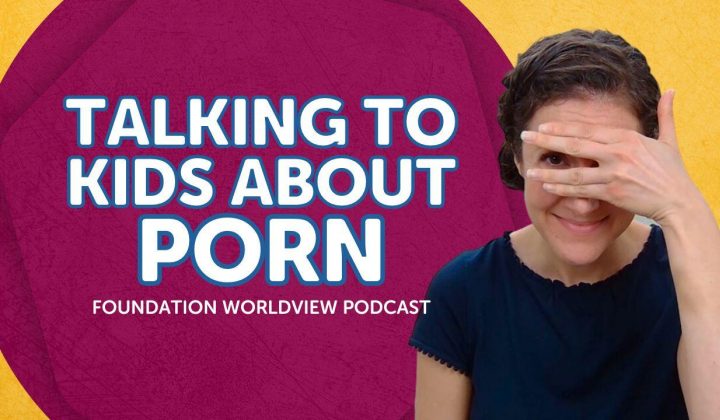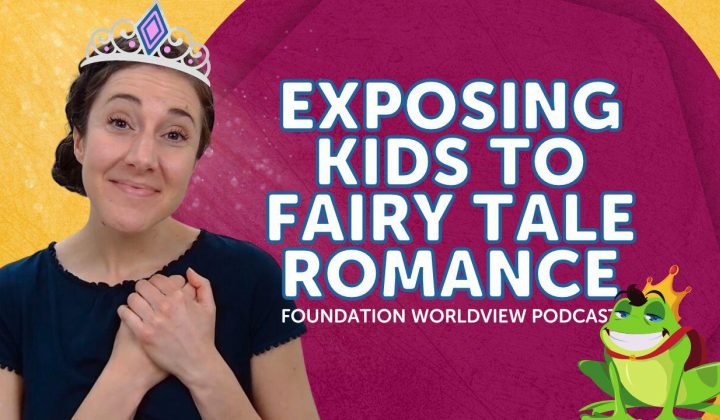Learn more about the journey that led to us equipping kids to carefully evaluate every idea they encounter.
Meet members of our team who have contributed to curriculum development.
Hear from real users of the Foundation Curriculum.
Learn what we believe about God, Jesus, Scripture, and more.
Encouraging Kids to Read the Bible
In this episode of the Foundation Worldview Podcast, Elizabeth Urbanowicz explores strategies to help children read the Bible independently, using a structured "I do, We do, You do" approach. She shares insights, resources, and personal stories to inspire a lifelong love for Scripture.
Transcript
Note: The following is an auto-transcript of the podcast recording.
Hello friends, and welcome to another episode of the Foundation Worldview Podcast where we seek to answer your questions so that you can equip the children that God has placed in your care to carefully evaluate every idea they encounter and understand the truth of the biblical worldview. I'm your host, Elizabeth Urbanowicz, and I'm thrilled that you've joined me for another episode today. Today's question says, "How can I encourage my kids to read the Bible on their own?" Another really great question, and I love that this person is thinking through how can kids do this independently. Because those of you who know me well know that I am very passionate about independence, about training our kids to do things on their own. So I'm excited to dive down deep into this question today.
But before we do that, if you have a question that you would like answered on a future Foundation Worldview Podcast, you can submit that question by going to FoundationWorldview.com/podcast. Also would ask that if you have found the content of this podcast beneficial that you would like and subscribe to make sure that you never miss any future episodes, and also ask that you would consider writing a review and sharing this content with those within your sphere of influence so that we can equip as many Christian adults as possible to get the kids in their care to carefully evaluate every idea they encounter and understand the truth of the biblical worldview.
Now, as we think through this question, how do we equip our children to read the Bible independently? I like to think of this one phrase that I would always use as I was planning my lessons in teaching, and I didn't come up with this phrase, I forget, it's some educational researcher that did. But the phrase is very simple. I do. We do. You do. One more time. That's, I do. We do. You do. And so it means that in order to equip kids to do something independently, first I as the adult need to do it and model it for them, then I as the adult need to come alongside the children in my care and we need to do this skill together. And then after sufficient practice and correction, then I hand off that skill to the child and that child, or you can do that by yourselves.
So we want to think of this, I do, we do, you do, when we're equipping kids and encouraging them to read the Bible. So we think about the I do phrase, the first thing that we need to make sure is we need to make sure that we as adults are having daily time in the Scriptures. Do we have daily time where we are studying God's Word?
Now, for those of you who are working with younger children, this is going to look a lot different than for someone who has older children because younger children are very physically demanding. So you might only have 5 to 10 minutes in the morning to quickly spend time in God's word, but 5 to 10 minutes a morning adds up to anywhere from 35 to 70 minutes throughout the entire week. So you just want to make sure that you are grounded in God's word because we can't pass along something to our children that we ourselves are not already doing.
And even if you think, well, Elizabeth, I just don't have time. Just set your alarm 5 to 10 minutes earlier and get up and spend time in God's word. Because if you were thinking about eating and what you need to eat in order to sustain yourself, you would never say, "well, you know what? I'm just so busy I don't have time to eat anything throughout my day." Because what would happen if you went several days without eating anything? Well, your body would not be able to sustain itself. You would not have the energy that you needed to actually parent the children that God has placed in your care.
Well, the same is true with God's Word. Jesus is the bread of life that without him sustaining us, we would not survive. And so if we want to be faithful in our work with these children that God has placed in our care, we have to make sure that we are sustaining ourselves spiritually because just as we couldn't survive physically without physical food, we cannot survive spiritually without spiritual food. And the other thing that's important about this "I do" where we're making sure that we are reading scripture ourselves is our kids are really going to pick up on that.
Even though my mom always got up before I did, even though I wasn't awake when she was reading her Bible, I knew that every morning just from times, either when I got up early to go use the bathroom or from times my mom shared things that she was learning in God's Word, I knew that before I would get up every morning, my mom would spend time in God's Word. She modeled that for me and my brother and my sister consistently. And I found the same thing is true in my own life, that even when I thought I was just spend time with God not to be noticed by anybody because I need that and because I love God and I want to seek him through His Word, but people notice that.
I remember when I used to live just outside of Chicago, I lived with two different roommates and in this house, the three of us lived together. And the first set of roommates I had in this house were both teachers at the school where I taught. And this one day, one of the teachers, one of my roommates was telling me about something difficult in her life. And I said, I'll be praying about that for you. And she's like, you know what? It means a lot when you say that because I know that you spend time with God and His Word every day, so I know that you actually mean that you will be praying for me. And that kind of shocked me because every day I would get up before my roommates and I would just sit in this chair in the living room and just spend a half hour reading scripture and praying. And it was before anybody else got up. So I had no idea that my roommates even knew that I would do this, but they did and it made an impact.
And so it's the same with us with our kids. We need to make sure that we are rooted in Scripture and modeling the goodness and the importance of spending time with God in His Word. Another part of this I do experience is actually reading the Bible to our children, that we should be reading passages of Scripture after dinner and before bed as we're tucking our children in that we want to make sure that we're modeling how to read Scripture so that we're reading it out loud to them. And you would be surprised at the young age at which children can understand Scripture being read to them and the impact that it has.
My pastor and his wife in Chicago were so great at this that even when their kids were really young, like three, two, and one, they would be reading each night a passage of Scripture with their kids and their kids would ask really great questions. And I encourage friends now all the time when they ask me what storybook Bible should I read to my kids? They say, there's a lot of great storybook bibles out there, but I recommend before bedtime you just read Scripture to your kids. And I know many friends are just shocked that their kids are actually engaged and they ask really good questions. So "I do" part of this that we need to make sure that we are reading scripture on our own and we are reading scripture to our kids.
The next step is the "we do" where we're going to do this together with our children. And so this is where we're going to be reading Scripture together with them. We're not just going to be reading it out loud to them, but they're actually going to be following along in the text and they're going to be doing some of the reading out loud.
So obviously this we do part usually can't happen until kids are seven or eight when they're pretty fluent readers, where this is where we're going to be reading Scripture together. And also we're going to be teaching them the skills that they need to soundly read, interpret, and apply Scripture. And if you're not sure how to do this, two resources I highly recommend. The first resource is a webinar that I did several months ago on Teaching Our Kids How to Read the Bible. And in that webinar we just go through systematically how can we equip kids with the skills that they need to soundly read, interpret, and apply Scripture? And if you're interested in actually investing in this way in the children that God is placed in your care, check out our Studying the Bible Curriculum. It's a 30 lesson curriculum that is giving kids, equipping kids with the skills that they need to soundly read, interpret, and apply Scripture.
So we need to do this together where we're reading scripture with our kids and they're reading it out loud and there are also following along in the text. And then we want to practice these skills together. So just make it a daily part of our routine, whether it's in the morning at breakfast, whether it's after dinner, whether it's before bed, or we're actually reading Scripture together and discussing it.
So first there's that "I do" where we need to model it, then "we do" where we read it together and we teach our kids these skills that they need in sound biblical interpretation. One of those skills, even if you've never watched that webinar or don't have our Studying the Bible Curriculum, one skill that I think is really, really important is we're teaching our kids to read verses in context. So we're not just teaching them to read one Scripture verse and talk about it, but where we're going to read a verse in its full context and then talk about it in that context.
Then "you do" part is where we actually provide time for our children to practice these skills independently. So we actually carve time out of our kids' day where they are studying God's word on their own. Now they may still need a little bit of direction so we can have time after that independent time to come and discuss as a family what they were learning about in Scripture. Now, if your kids go to school, whether it's public school or private school, obviously you're going to be a little bit more limited in the time that you have with them. So this is a time where you're either going to have your kids wake up a little bit early or you're going to set aside some time after school or some time right before bed where they're going to be reading the Bible independently. And then have a time where you can come together as a family and talk about the things that they learned or any questions that they have from that independent time.
If you homeschool your children or do some sort of collaborative model where they're in school a few days a week and then they're homeschooled the other days a week, you're going to have a little bit more flexibility in your time, and you can actually include this as part of your school day. This could even be something after you take your lunch break that then they could have 15 to 20 minutes of Bible reading time and time when they're writing down some of their observations, some truths that they're learning about God and humans and God's big plan in Scripture. And then you can set aside time, whether it's daily or once a week or twice a week, where you come together and you talk about the things learned during that independent Bible study time. And you'd be surprised that once we equip kids with these skills and we make it a habit, even if they don't love it, even if they protest, we're still developing, we're cupping to cultivate the affections of their heart and the rhythms of their hand and the thoughts of their mind. And these are habits that can stick with them.
Just a few months ago, my brother went to a new doctor, and when the doctor saw his last name, he said, oh, are you related to Elizabeth Urbanowicz? And my brother said, yes. And then the doctor shared with my brother how his son had been in my class as a third grader and his son is now a senior in high school. And he said, "oh, make sure you tell your sister that my son reads his Bible every single day, and he has read through the Bible cover to cover multiple times because of the skills that your sister taught him when he was in third grade." And so these things really can stick with kids.
Before we wrap up this episode, there is a tradition within the Jewish community that I just love and I think could be one that's so powerful to implement with our children. And in the Jewish community, when a child is first being taught how to read, the parents will take a book and then we'll take a little bit of scoop of fresh honey and put it on the book, and then they'll give the book to the child, and the child's supposed to take their finger and scoop the honey off and taste it, and then the parent will say something to the effect of "Knowledge is sweet and it can be chased through the pages of a book." And I thought, wow, like what if we could do this with our kids? Because in scripture we're told that we are to taste and see that the Lord is good. And so what if we took a Bible and we put a little dollop of honey on it and we had our kids take their finger and scoop it off the book and say, "we are called to taste and see that the Lord is good, and God's words are sweeter than honey to our lips."
Well, that's a wrap for this episode. Just want to make sure as we leave our time together that we're remembering that "I do, we do, you do" as we're equipping our kids to soundly read, interpret, and apply Scripture, and to really develop in them a love for God's Word.
As we leave our time together, my prayer for you as always is that no matter the circumstances in which you and the children God has placed in your care, find yourselves, you will trust that God is working all things together for your good by using those circumstances to conform you more into the image of His Son. I'll see you next time.
Related Posts and insights

How To Talk To Kids About Porn
In this episode of the Foundation Worldview Podcast, host Elizabeth Urbanowicz discusses the crucial topic of when and how to start talking about pornography with our kids. The episode covers important aspects such as being proactive in addressing the issue, understanding what children are exposed to, and building a positive biblical foundation for human dignity and God's design for sex and sexuality.

Exposing Kids to Fairy Tale Romance
Today's question says, "Is there a connection between introducing romance, even innocent romance, in movies and books at a young age, ie Disney animated movies, et cetera, and a child's interest in romantic relationships, dating, sex, or porn?"

When To Have The Sex Talk?
How should you have the sex talk with your son or daughter? Do you talk to them individually or as a group? This episodes takes a look at the goals behind the sex talk and provides tips to have this conversation with your child. We also include information on resources that are available to help parents talk to their kids about sex.





